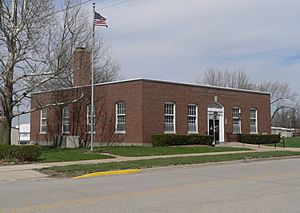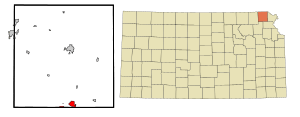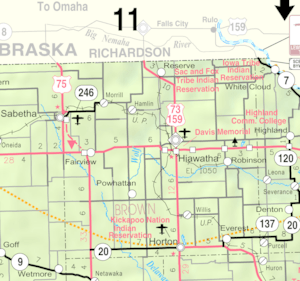Horton, Kansas facts for kids
Quick facts for kids
Horton, Kansas
|
|
|---|---|

Post Office in Horton (2015)
|
|

Location within Brown County and Kansas
|
|

|
|
| Country | United States |
| State | Kansas |
| County | Brown |
| Founded | 1886 |
| Incorporated | 1887 |
| Named for | Albert Horton |
| Area | |
| • Total | 1.68 sq mi (4.36 km2) |
| • Land | 1.67 sq mi (4.32 km2) |
| • Water | 0.01 sq mi (0.04 km2) |
| Elevation | 1,053 ft (321 m) |
| Population
(2020)
|
|
| • Total | 1,523 |
| • Density | 906.5/sq mi (349.3/km2) |
| Time zone | UTC-6 (CST) |
| • Summer (DST) | UTC-5 (CDT) |
| ZIP code |
66439
|
| Area code | 785 |
| FIPS code | 20-33200 |
| GNIS ID | 485595 |
Horton is a friendly city located in Brown County, in the state of Kansas, United States. It's a place with a small-town feel. In 2020, about 1,523 people called Horton home.
Contents
A Look at Horton's History
Horton was officially started in 1886. The city was named after Albert H. Horton. He was a very important judge for the Kansas Supreme Court.
In 2013, a TV show host from CNBC visited Horton. The show was called The Profit. The host wanted to help make Horton's downtown area better.
About 18 months later, the community began a project. It was called the "Reinvent Horton" campaign. People worked together to clean up the city. They also updated older parts of town. This included adding new sidewalks and light poles. Some old buildings were also removed. It was a big effort by everyone to improve Horton.
All About Horton's Geography
Horton is a small city in terms of size. It covers about 1.80 square miles (4.66 square kilometers). Most of this area is land. Only a tiny part, about 0.02 square miles (0.05 square kilometers), is water.
Horton's Climate and Weather
Horton has a climate known as "humid continental." This means the weather changes a lot between seasons. Summers are usually warm or hot. They can also be quite humid. Winters are cold, and sometimes very cold.
The city gets a good amount of rain throughout the year. Snowfall is common in the winter months. The weather can vary greatly from day to day.
| Climate data for Horton, Kansas (1991–2020 normals, extremes 1891–present) | |||||||||||||
|---|---|---|---|---|---|---|---|---|---|---|---|---|---|
| Month | Jan | Feb | Mar | Apr | May | Jun | Jul | Aug | Sep | Oct | Nov | Dec | Year |
| Record high °F (°C) | 74 (23) |
82 (28) |
94 (34) |
96 (36) |
104 (40) |
108 (42) |
111 (44) |
112 (44) |
109 (43) |
96 (36) |
84 (29) |
74 (23) |
112 (44) |
| Mean maximum °F (°C) | 60.7 (15.9) |
65.5 (18.6) |
78.4 (25.8) |
84.8 (29.3) |
90.3 (32.4) |
94.8 (34.9) |
99.2 (37.3) |
97.7 (36.5) |
92.5 (33.6) |
86.4 (30.2) |
73.1 (22.8) |
63.0 (17.2) |
100.7 (38.2) |
| Mean daily maximum °F (°C) | 36.9 (2.7) |
42.6 (5.9) |
54.0 (12.2) |
64.4 (18.0) |
75.1 (23.9) |
84.1 (28.9) |
88.4 (31.3) |
86.8 (30.4) |
79.5 (26.4) |
67.3 (19.6) |
52.6 (11.4) |
40.7 (4.8) |
64.4 (18.0) |
| Daily mean °F (°C) | 26.3 (−3.2) |
31.1 (−0.5) |
41.9 (5.5) |
52.8 (11.6) |
64.2 (17.9) |
73.8 (23.2) |
78.1 (25.6) |
75.8 (24.3) |
67.6 (19.8) |
54.6 (12.6) |
41.3 (5.2) |
30.6 (−0.8) |
53.2 (11.8) |
| Mean daily minimum °F (°C) | 15.7 (−9.1) |
19.6 (−6.9) |
29.9 (−1.2) |
41.3 (5.2) |
53.3 (11.8) |
63.6 (17.6) |
67.7 (19.8) |
64.8 (18.2) |
55.8 (13.2) |
42.0 (5.6) |
29.9 (−1.2) |
20.4 (−6.4) |
42.0 (5.6) |
| Mean minimum °F (°C) | −5.2 (−20.7) |
2.4 (−16.4) |
11.9 (−11.2) |
25.5 (−3.6) |
37.7 (3.2) |
49.9 (9.9) |
56.8 (13.8) |
54.0 (12.2) |
39.7 (4.3) |
25.6 (−3.6) |
14.0 (−10.0) |
2.9 (−16.2) |
−8.0 (−22.2) |
| Record low °F (°C) | −33 (−36) |
−26 (−32) |
−18 (−28) |
3 (−16) |
26 (−3) |
40 (4) |
44 (7) |
40 (4) |
27 (−3) |
11 (−12) |
−5 (−21) |
−27 (−33) |
−33 (−36) |
| Average precipitation inches (mm) | 0.76 (19) |
1.28 (33) |
2.13 (54) |
3.82 (97) |
5.23 (133) |
4.77 (121) |
5.42 (138) |
4.27 (108) |
3.71 (94) |
3.25 (83) |
1.81 (46) |
1.49 (38) |
37.94 (964) |
| Average snowfall inches (cm) | 2.8 (7.1) |
2.9 (7.4) |
0.9 (2.3) |
0.2 (0.51) |
0.0 (0.0) |
0.0 (0.0) |
0.0 (0.0) |
0.0 (0.0) |
0.0 (0.0) |
0.2 (0.51) |
0.6 (1.5) |
3.1 (7.9) |
10.7 (27) |
| Average precipitation days (≥ 0.01 in) | 4.7 | 5.6 | 6.8 | 9.8 | 11.2 | 9.8 | 9.4 | 8.4 | 7.5 | 7.3 | 5.5 | 4.6 | 90.6 |
| Average snowy days (≥ 0.1 in) | 1.5 | 1.7 | 0.7 | 0.2 | 0.0 | 0.0 | 0.0 | 0.0 | 0.0 | 0.2 | 0.5 | 1.2 | 6.0 |
| Source: NOAA | |||||||||||||
Horton's Population and People
The number of people living in Horton has changed over the years. In 1890, over 3,300 people lived there. The population grew until the 1930s. Since then, it has slowly become smaller.
| Historical population | |||
|---|---|---|---|
| Census | Pop. | %± | |
| 1890 | 3,316 | — | |
| 1900 | 3,398 | 2.5% | |
| 1910 | 3,600 | 5.9% | |
| 1920 | 4,009 | 11.4% | |
| 1930 | 4,049 | 1.0% | |
| 1940 | 2,872 | −29.1% | |
| 1950 | 2,354 | −18.0% | |
| 1960 | 2,361 | 0.3% | |
| 1970 | 2,177 | −7.8% | |
| 1980 | 2,130 | −2.2% | |
| 1990 | 1,885 | −11.5% | |
| 2000 | 1,967 | 4.4% | |
| 2010 | 1,776 | −9.7% | |
| 2020 | 1,523 | −14.2% | |
| U.S. Decennial Census | |||
What the 2020 Census Showed
The 2020 United States census counted 1,523 people in Horton. There were 638 households, which are groups of people living together. About 369 of these were families.
Most people in Horton are white. There are also people who are Native American, African American, and Asian. Some people are from Hispanic or Latino backgrounds. Others identify with two or more races.
About 26.6% of households had children under 18. Many households were married couples. Some households had a single parent. The average age of people in Horton was 42.5 years.
What the 2010 Census Showed
In 2010, the census counted 1,776 people living in Horton. There were 732 households. The city had 904 housing units.
The population was mostly White. There were also people who were Native American, African American, and Asian. Some people were from Hispanic or Latino backgrounds.
About 31.8% of households had children under 18. Many were married couples. The average age in the city was 38.3 years.
Education in Horton
Students in Horton attend schools run by the South Brown County USD 430 public school district.
- Horton High School is the main high school in the area.
Famous People from Horton
- Boots Adams – a successful businessman.
- Robert Harder – a politician who served in the Kansas legislature.
See also
 In Spanish: Horton (Kansas) para niños
In Spanish: Horton (Kansas) para niños
 | Shirley Ann Jackson |
 | Garett Morgan |
 | J. Ernest Wilkins Jr. |
 | Elijah McCoy |

